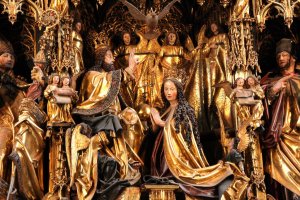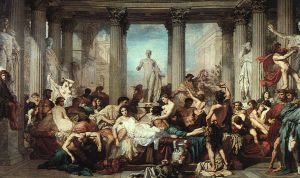A violent year was ending; this ‘august’ day was also in the middle of a hard winter – and it was even rougher inside the moderate climes of Rome. This particular year was 27 BCE. It was the month of January, and the new emperor of the great Roman Empire claimed the day of the 16th as an imperial holiday. The emperor’s name for historical posterity was Octavian Augustus.
During the subsequent years of his reign, he would use all of the ancient classical methods in maintaining social control over Rome’s subject populations. The Roman Empire would never experience its previous civil wars again, yet he snuffed out the Roman Republic from its existence. He replaced the Republic with an Empire and the rest was history.
The first method in social control was Octavian Augustus successfully claiming the rituals, images and titles of legitimate authority. His second method ingeniously utilized slow and repressive tyranny with token reforms. The third method represented the mastery of the bread and circuses spectacle. The fourth used the infamous, and always-triumphant, political technique of divide and you shall conquer. The fifth aspect of control made use of naming enemies and aggravating the public fear of such enemies. The sixth system of statecraft employed selective justice and pardons for some, while making brutal examples against a few easier targets, or called ‘the carrot and the stick’ approach. The final one, and most important method tied with the first one, availed in him creating state mythologies out of selected events.
And many patrician elites, the senate, the army, common plebes, farmers, artisans, foreign citizens, resident merchants and even slaves would commend the name of August for historical posterity. In fact, this dictator’s name now has the English synonym of prestigious. A month in our Gregorian calendar also has the name August. This short story is how it got that way.
On this day, the 16th of January, 27 BCE, called ‘the first settlement,’ his friend and associate, Lepidus, received the spiritual title of the top priest in the Roman religion, ‘the Pontifex Maximus.’ Lepidus and Augustus acted through a complete religious ceremony that included animal sacrifices and sacred rituals. Lepidus dressed accordingly in the beautiful robes and hat of a Pontifex Maximus. Octavian was not finished however, for he soon dashed into the public state theater in his imperial purple and crimson toga over his old military outfit, when he was previously a military commander of a victorious Roman legion. In one full super event, he claimed all three state powers and legitimized his rule: spiritual, political and military. Octavian Augustus would eventually take the imperial spiritual title of Pontifex Maximus from his old client Lepidus.
While Octavian claimed the semi-divine powers over life and death within the entire empire, he also instituted some important reforms on this sacred holy day. He symbolically handed over his legislative power to the Senate, where a faction of that body had warred against his late, assassinated protégé, Julius Caesar. Augustus made sure that the name and title of Caesar also possessed a semi-divine stature, and Octavian took the name of Caesar as the eternal symbol for the Roman emperor – and which would signify emperor even until modern history, with such bogus titles as Kaiser and Czar.
The entire ritual set up featured senators, military commanders with their officers in full military campaign dress, and a flourish of Romans, equestrians, gentleman farmers and distinguished citizens standing in awe inside of the imperial city, surrounded by grandiose, cleaned white temples and Roman imperial majesty. With all of the state pomp and ritual, which utilized all of the five senses and displayed the flourish of power and greatness, the emotional crowd screamed the new titles and powers of Octavian: ‘Princep,’ or First Citizen, ‘Consul,’ or legislative-military adviser, and ‘Imperator.’ or military commander.
This public ritual super event solidified both his power and legitimacy to rule, while he simultaneously showed his historic preservation of the old Roman values of ‘Dignitas,’ or public honor, ‘Gravitas,’ or public temperance, and ‘Auctoritas,’ or valued wisdom. In an ancient historical age without the Internet, video, television, film, radio and photo-print media, Octavian the Great had prepared a true masterpiece of state theater.
Octavian the Augustus claimed even greater honors, all for his ‘duty’ to Rome. He set up another date of glory called the ‘second settlement,’ where he claimed the powers of the ‘Tribune,’ or the sacred interests of the people, called the ‘Popolus.’ Augustus even claimed that the massive conglomerations of Rome actually represented one great family on the Earth, and so his ultimate title was ‘Pater Patriae,’ Father of the sacred country. In an Empire that swarmed on three different continents while possessing many different languages and cultures, this new truth was certainly something else to believe.
But sacred state rituals and costumes in the service of legitimacy needed some more backing for wider public support. Augustus became the Roman game and circus leader extraordinaire. Normally, such games and circuses happened only during Roman holy days, or holidays. But Augustus kept the party spirit burning with lots of back to back contests of chariot races, gladiator fights, mock battles, and even naval ones, and public contests of lyrical-musical, religious, poetic and physical glories. During these festivals and spectacles, Augustus distributed rations of bread, killed bull meat, and watered down wine to the anxious urban crowds in Rome. The theatrical comedies were in full operation, and the emperor even rebuilt the great Theater of Apollo.
Octavian had also made sure that his rival enemies ended up fully destroyed and discredited. Octavian’s greatest concern was Caesar’s cousin and Roman hero, Mark Antony and his relationship to Cleopatra in Egypt. Octavian managed to pull the Roman Senate against the Mark Antony, and he had even read the supposed will of Mark Antony to the Roman people in the Forum market. Like a skilled manipulator, Octavian moved the public sentiment against the ‘dictatorial degenerate’ lying in waste at Cleopatra’s palace in Egypt. Eventually, Octavian managed to seize a Roman legion that exterminated his followers, and he even ordered their son, Caesarion, killed. Any Roman associated with such a rabble became a public enemy of the Roman people.
While the circuses and bread distribution progressed, Octavian warned the Roman people of the coming sacrifices ahead in order to maintain their wonderful empire. Continual war was the other standard in Octavian’s rule. The Celtic nations in Gaul, or France, and in Hispania, or Spain, still needed the iron discipline of Roman blood and fire. Augustus also had to exterminate the pirate danger in the Mar Nostrum, or the Mediterranean Sea.
Earlier, Octavian had finished off one of the sons of Pompey; Pompey the Great was an old Roman General and ally, later enemy, of Caesar. His sons still had a base of operations in the wilds of Sicily. Augustus’ latter warfare eventual paid off with full victories in Spain and in France. His Germania, or German campaigns, did not gain much territory. In fact, his war campaign against the German nations ended in defeat, but the Roman blood would demand future sacrifice in subduing them. His descendent Claudius would do the faithful job.
In the east, he took Egypt, grabbed more territory from Dacia, or Rumania, and Rome successfully battled the Parthians, or Persians-Iranians, whereby the Roman imperial standards moved from Mesopotamia, or Iraq, into Northern Africa, and on the northern periphery, from the Danube to the Rhine river. Octavian Augustus had many spectacular public triumphs in his city of Rome. His unforgettable triumphant returns featured marching Roman legions in sync, loud war drums, megalith flower displays, stolen religious objects on pedestals, massive stone gods brought back on ships, and thousands of unfortunate captured slaves in chains.
Octavian always maintained the astute politician role. He knew when to offer pardons and patronage, and with other unfortunates, exterminate them mercilessly. He had all of the Senatorial conspirators associated with the assassination of Caesar exterminated – including the noble Cicero, yet he lavished power and patronage on the rest of the Roman Senate to help ‘govern’ the Empire. He exterminated the last heir of Mark Antony and Cleopatra, yet he pardoned Mark Antony’s brother that warred against him in the Perusine War. He ultimately exterminated the sons of Pompey, or the Pirates of Sicily, and yet, he redistributed lands in Italy to his Roman soldiers that faithfully fought with him and even with those that fought for Mark Antony – and he pardoned his old ally Lepidus when his old and disgruntled client decided to battle against him.
Finally, Augustus was the master in creating a renewed imperial and cultural mythology. His death culminated in Roman holiday celebrations that included a monolithic funeral cortège of flower wreaths featuring his noble family and the successor emperor, Tiberius, the Roman Senate, the Roman Praetorian Guard, or elite soldiers, equestrian Roman cavalry, Roman legions stationed near the city of Rome, and throng of innumerable Roman nobles, plebes and citizens in mourning. Augustus financed many public work projects, and his most famous was the construction of the Pantheon, which still stands in the actual Rome of today. His burial took place in the sacred corner of the temple, and his ‘Genius,’ or essence received deification. His eulogies also spread to other writers, intellectuals and historians that Augustus patronized. The greatest work was the epic tale of the Romans, called the ‘Aeneid,’ which traced the early history of Rome back to the honorable and courageous, Trojans – and finishing with Augustus, of course.
And so, the mythology of Octavian Caesar Augustus still lives in historical grandeur, or historical infamy, if you are an Anarchist. His statecraft also continues to breed its monsters. Since those ancient times, uncountable emperors, dictators, thugs on thrones, tyrants, princes, kings, queens, dukes, state criminals, sociopaths, prime ministers, presidents and self-proclaimed leaders have utilized the same methods and have unfortunately made them work.
Now the readers know the truth of such tactics and we can counter them. Anarchists can tell this story and other such examples to the angry and the ignorant. The astute reader can also see how the current monstrosity of empire, the United States of America Empire, has also used, and continues to use, such sinister practices of public manipulation.
But the current evil Amerikan empire has even greater power at its disposal in statecraft and social control. This criminal regime in Washington D.C. has been, and always will be, the greatest at utilizing particular modus operandi: media advertising through image-phrase repetitions, emotional manipulations, and blatant news speak propaganda.



